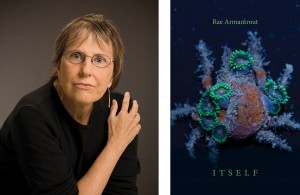When asked about her favorite poems, Rae Armantrout replied with “1259” by Emily Dickinson. We’re sharing the poem today, to celebrate National Poetry Month and Rae Armantrout’s birthday!
1259
A Wind that rose
Though not a Leaf
In any Forest stirred
But with itself did cold engage
Beyond the Realm of Bird—
A Wind that woke a lone Delight
Like Separation’s Swell
Restored in Arctic Confidence
To the Invisible—
Though not well known, this is one of my favorite Dickinson poems. It works through a complicated and unstable metaphor. As a literal wind kicks up a wave which travels awhile and then subsides into the sea, Dickinson’s more mysterious wind provokes a private mental event—an idea or feeling, maybe a poem, or even the birth of an individual consciousness itself—which is manifest for awhile before sliding back into invisibility. We might expect there to be a pathos to this process, but, instead, there is a defiant and almost autoerotic “Delight.” This poem seems like a kind of poetics statement.
No one combines seemingly dissonant words and concepts more surprisingly and to better effect than Dickinson. That’s what I love most about her – and there are two great examples in this poem. You will almost certainly never find the words “cold” and “engage” sitting side by side anywhere else. “Coldly engage,” which would still be surprising, would be more correct, of course, but nowhere near as good. “Cold” in its noun form prepares us for the later appearance of Arctic. It suggests both cold water and dispassionate intellectual fascination. What’s more, it hints at an attraction to the cold. It’s also worth noting that the long “o” in cold travels like a wave throughout the poem appearing in “rose,” “woke,” and “lone” – all one syllable words. The second really surprising word combo in this poem is “Arctic” and “Confidence.” Surely these words have never been seated together before. They create an interesting ambiguity here. Confidence might mean self-assurance, an independence enjoyed by this wave, but it might just as easily mean something like the opposite – “confidence” as shared secret or confession. Both work! If we lean towards the latter, as I do, then we have to wonder what kind of “confidence” can be described as “arctic.” Perhaps the very poem we are reading is such a confidence, one shared with the theoretical audience who might (or might not) read her long after her death.
This poem isn’t one of Dickinson’s anthology pieces, so I feel a kind of “lone Delight” whenever I read it, but I am glad to share it here.
–Rae Armantrout

Rae Armantrout is the author of twelve books of poetry, including Just Saying, Money Shot, and Versed, winner of the 2010 Pulitzer Prize for Poetry and the 2009 National Book Critics Circle Award. She is a professor of writing and literature at the University of California, San Diego. Her twelfth book, Itself, was published by the Wesleyan University Press in 2015. Partly: New and Selected Poems is forthcoming in August 2016.
Be sure to check out our new poetry!

Common Sense (Ted Greenwald)
Age of Reasons: Uncollected Poems 1969–1982 (Ted Greenwald)
Azure: Poems and Selections from the “Livre” (Stéphane Mallarmé)
Fauxhawk (Ben Doller)
Scarecrow (Robert Fernandez)
The Book of Landings (Mark McMorris)
A Sulfur Anthology (edited by Clayton Eshleman)






